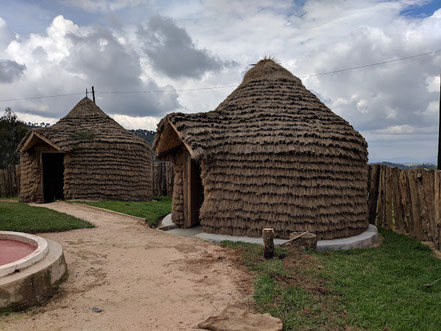how much does it cost to sleep at kitabi eco center?
Self-camping
1-person -$15
Camping +gear+rental
1-person-$25
2-persons-$40
3-persons-$65
Kings palace
1-2 persons-$100
3-4 persons-$120
4-6 persons-$150
Prince's palace
1-person-$45
2-persons-$60
3-persons-$75

Kitabi eco –center is heartwarming mid-range hospitality, creating its own gags, located just 2 kilometers away from Nyungwe Forest National Park Eastern Entrance, sitting on top of Mount Kitabi, offering striking, breathtaking panoramic views of Rwanda. Click here to view mountain gorilla trekking safaris.
Kitabi eco-center is the princes and the king’s places which are the traditional Rwandan huts with an exclusive tranquility, amazing light green tea plantation, neat, terraced farms, infinite hills ,Dark green trees of Nyungwe rain forest ,sunrise from the east wing &sunset from the western wing and the most beautiful innumerable sky which can’t be justified by words. Click here to see our recommended mountain gorilla trekking tour.
Kitabi Eco Center offers entertainment to visitors from different cultural troupes, showcasing their culture through folk songs, traditional cuisine, and dance. Visitors get a variety of services, like camping.
Tourists can carry their own tents, hire tents, or choose to sleep in traditional grass thatched huts where the kings and princes lived.
what can i do near Kitabi eco center?
Nyungwe Forest National Park is the largest Afro-montane forest situated in southwestern Rwanda, towards the Burundi border, the Democratic Republic of the Congo, and bordering Lake Kivu in the south. Nyungwe Forest National Park is known for its biodiversity, which comprises over 200 orchids, 1050 plant species, 120 butterfly species, 310 bird species, 29 Albertine rift endemics, and 85 mammals, including 13 primates such as chimpanzees, red-tailed monkeys, and blue monkeys, among others.
Chimpanzee tracking in Nyungwe Forest National Park involves a traveler’s movement into the forest on foot while searching for habituated chimpanzee families in their natural habitat. Nyungwe Forest chimpanzee tracking kicks off with an early morning briefing about the rules and regulations of tracking chimpanzees at the park headquarters, where you are allocated to a habituated chimpanzee family.
The canopy walk at Nyungwe Forest National Park is an adventurous activity that starts from the Uwinka visitor’s center and takes at most 2 hours at 90 meters long and 60 meters above sea level. During the canopy walk, visitors always get an opportunity to enjoy the view of the Nyungwe forest. Primate species that can be spotted include black and white colobus monkeys, olive baboons, blue monkeys, l’hoest monkeys, red-tailed monkeys, more than 310 bird species, and tree species, among others.
Colobus monkey trekking is an incredibly adventurous activity in Nyungwe Forest National Park. Nyungwe Forest National Park harbors over 300 colobus monkeys, and tracking begins with a morning briefing at the park headquarters.
Nyungwe forest national park harbors more than 310 bird species, which include the 29 Albertine Rift endemic species, migratory birds, and forest bird species that make Nyungwe a birder’s haven. Nyungwe has well-constructed trails for bird watching, Nyungwe birding experience trails include Gisakura trail, Karamba trail, Bigungu Trail, and Kamiranzovu Trail.
When is the best time to visit Nyungwe Forest National Park?
The best season to visit Nyungwe Forest National Park is in the long peak season that lasts from June, July, August, and September, or in the short dry months of mid-December to mid-February. Travelers should expect some rain showers during the short season, since it falls among the two rainy seasons.
